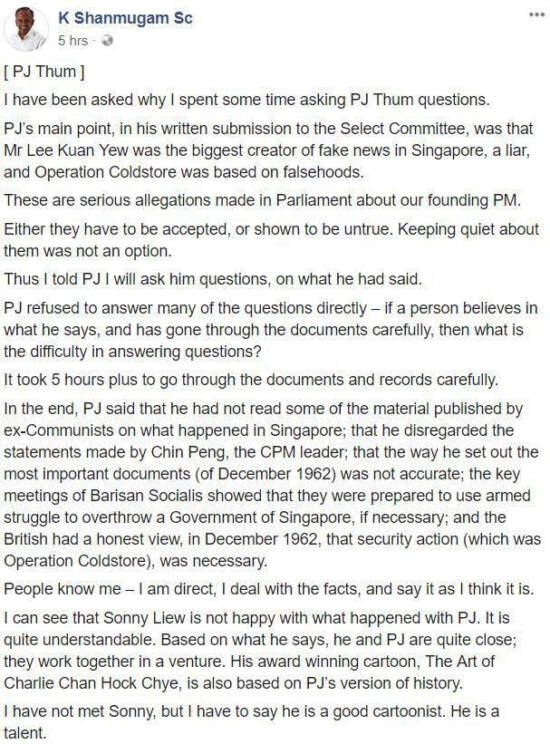Comic book writers should spare a thought for colleagues in countries where politics intersects with creation. In this article, we look at a controversy which has arisen in Singapore pitting a comic book creator against its government. Singapore is a democracy with rule-of-law institutions inherited from its time as part of the British Empire. Singapore however has robustly defended views on its history, and does not like these views to be challenged.
The surprise winner of the 2017 Eisner Awards was Singaporean comic book creator Sonny Liew. Mr Liew wrote a 320-page graphic novel entitled The Art of Charlie Chan Hock Chye which has an eclectic mix of robots and aliens but also particular historical views of Singapore. The New York Times notes:
The result is a kaleidoscope of art that pays tribute to Osamu Tezuka’s Astro Boy, Walt Kelly’s Pogo and Steve Ditko’s Spider-Man. Mr. Liew adds to the sense of a reimagined past by tossing in watercolor sketches of destroyed sections of the old city, oil portraits of the main characters, and old photos.

Censorship in Singapore is subtle. In this instance, Mr Liew benefited from a cash grant from the Singaporean Government instrumentality called the National Arts Council. When Mr Liew’s work was published and the content became the subject of broad public scrutiny, the National Arts Council withdrew that funding. Mr Liew then unexpectedly won three of the six Eisner Awards for which his work was nominated. Eisner Awards are the peak international recognition of comic book excellence. The National Arts Council sent by Facebook a terse message of congratulations to Mr Liew, failing to mention the title of the comic.
What was the controversy? The Japan Times summarises it:
“…the story — which retells Singapore’s story from the 1950s to the present through the eyes of a fictional cartoonist — questions the official narrative hammered into citizens of the tightly controlled city-state from a young age.
A central character is a real-life figure, Lim Chin Siong, a popular left-wing trade union leader who was a rival to Singapore’s authoritarian founding father, Lee Kuan Yew, in the ’60s, and who was jailed during Lee’s rule.
Lim plays little part in official histories of that tumultuous period when Singapore became independent from British rule, an era marked by protests and riots, but the book presents an alternative vision of the past in which the late politician becomes prime minister.
On the other hand, Lee — the central figure in Singapore’s official histories and revered by many for transforming the city-state into one of the world’s richest societies — is presented in an unflattering light, as a hard-line ruler who brooked no criticism.”
**
The popular and charismatic Mr Lim is portrayed in the comic as someone who, but for jail at the hands of Mr Lee, could have been a prime minster of Singapore. But Lee Kwan Yew’s memory and legacy within Singapore is sacrosanct. Further, the comic examines whether there really was a Communist threat to Singapore, which underpinned Mr Lee’s hardline approach to securing rule in the newly independent country.

The National Arts Council publicly expressed the view that the interpretation within The Art of Charlie Chan Hock Chye of Singapore’s history “potentially undermines the authority of legitimacy of the government and its public institutions.” This negative assessment triggered a stampede: what was a thousand copy print run increased to a 15000 copy print run and a translation of the comic into four languages.
In September last year, Mr Liew was reported to have returned to the National Arts Council funding which he had received for his forthcoming work, and has declined to speak at the National Arts Council’s writers festival.
In late March 2018, Mr Liew lashed on Facebook out at Singaporean authorities over the treatment of Mr Liew’s collaborator, Dr Thum Ping Tjin, who are both involved in the website called New Naratif. According to Singaporean publication The Newspaper, the Singapore Government’s Law and Home Affairs Minister K. Shanmugam “had spent close to six hours last Thursday grilling Dr Thum Ping Tjin on his work on Singapore history, such as Operation Coldstore in 1963, as part of the Select Committee hearings on deliberate online falsehoods.”
An inquisitorial chamber established by the Singaporean government, with an Orwellian-sounding name, the website of the Select Committee on Deliberate Online Falsehoods is located here.
Mr Liew wrote on Facebook: “What transpired during the six-hour hearing though was a kind of darkness I’d not quite seen before in Singapore with my own eyes…. The taste left on the tongue was a show trial, a stage-managed attack on a person’s integrity and credentials.” He also drew a portrait of Mr Shanmugam, standing menacingly behind an alert attack dog. The dog’s coat features a lightning bolt, about the place where Mr Shanmugam‘ penis would be:

Mr Shanmugam responded with a Facebook message noting that Mr Liew is “quite close” to Dr Thum and that his award-winning book is also “based on” Dr Thum’s version of history. “I have not met Sonny, but I have to say he is a good cartoonist,” said Mr Shanmugam. “He is a talent.” The full text is below. It clearly is intended to have a chilling effect:

One allegation contained in this Facebook post is that The Art of Charlie Chan Hock Chye draws upon the alleged falsehoods of Dr Thom’s version of history. Mr Liew’s fame and international success clearly shields him from some of Singapore’s nastier aspects. He is polite in his criticisms and has taken great pains to back up the controversial aspects of his comic with evidence. Defamation has long been the weapon of choice of Singapore’s masters (including, notoriously, Mr Lee), and so Mr Liew must be very cautious. Such is the existence of the city-state’s greatest comic book creator.

